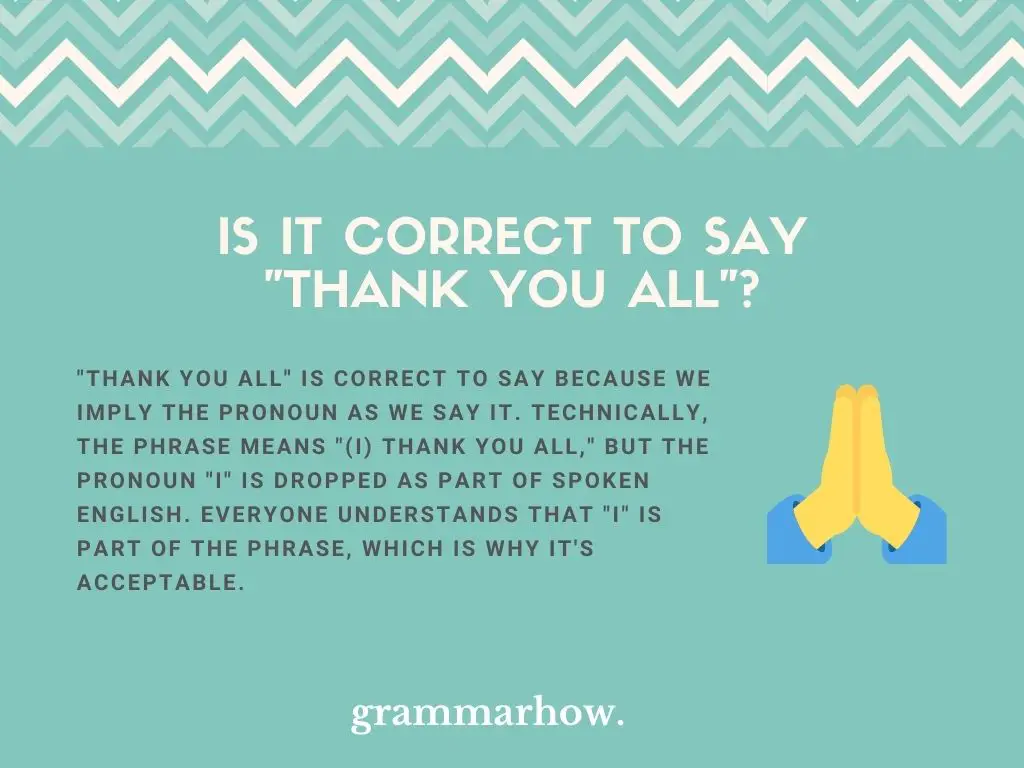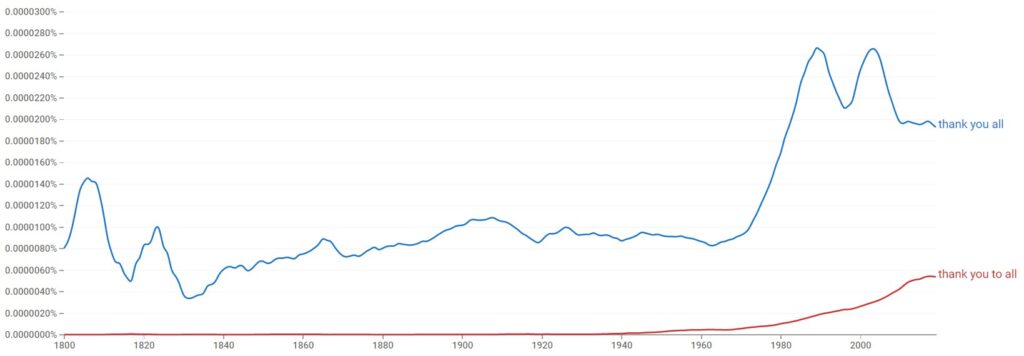When trying to address a group with a “thank you,” you might be left with a few options. Luckily, the phrase “thank you all” seems to cover most of what people are worried about. This article will explain how “thank you all” works and how it is grammatically correct.
Is It Correct To Say “Thank You All”?
“Thank you all” is correct to say because we imply the pronoun as we say it. Technically, the phrase means “(I) thank you all,” but the pronoun “I” is dropped as part of spoken English. Everyone understands that “I” is part of the phrase, which is why it’s acceptable.

The phrase uses the verb form “to thank.” Many people worry about using verbs without pronouns because it doesn’t seem like a grammatically correct choice. However, plenty of “thank you” forms all drop the pronoun:
- (I) thank you
- (I) thank you all
- (I) thank you very much
As you can see, when using “thank” as a verb, the pronoun is always implied.
We won’t typically use the phrase without needing the phrase written. People accept that the person speaking is the one delivering the “thanks,” which is why it’s redundant to include your pronoun as part of the phrase.
Examples Of How To Use “Thank You All” In A Sentence
It might help you to see some examples of the phrase in action. That way, you’ll better understand when are where most people tend to use it.
- Thank you all for showing me the appreciation I needed.
- Thank you all for being there for me, even when I was at my lowest point.
- Thank you all for being so kind, and I’ll be sure to let you know what happens when I get back.
- Thank you all for everything you’ve done. You will never know just how much it means to me.
- Thank you all for the lovely words. I’ll be sure to relay them to him when I see him next.
- Thank you all for being with us at this difficult time. I’m sure my father would be happy to hear from you all.
- Thank you all for listening to my speech.
- Thank you all for being here today, and I hope this assembly will be worth it.
- Thank you all for helping me with those problems. Without you, I don’t know where I would be today.
- Thank you all for the things you’ve done. You’re all amazing people, and I’m lucky to call you my friends.
“Thank you all” works when addressing a group. “All” refers to multiple people in a room, and we use it to generalize the people we’re talking to as one particular group. It never works in a singular case.
Is “Thank You All” Rude?
There are a few people that believe phrases like this might be rude or impolite. However, these people are basing their information on common misconceptions in English, and it would help to know the truth.
“Thank you all” is not rude. In fact, it’s a polite way to address a group of people and show them that what they have done for you means the world to you.
Of course, if you are talking to really close friends and family, nothing will be a truly personal “thank you.”
Most people would expect you to single them out if they’ve done truly beneficial things for you. Therefore, a “thank you all” might not be well-received. However, this is only in the cases where people expect a genuine “thank you” for all that they’ve done.
Generalizing a group of people can be insulting to a select few. But it’s only insulting to the people who have been the most helpful for you.
For example, you might be saying “thank you all” to a group consisting of your mother (who raised you) and a random coworker (who helped you with a project). The two things are not equal, and your mother might be upset without a proper “thank you” for her.
Is It Better To Use “Thank You To All”?
There is another way to use the phrase, and that’s when we say “thank you to all.” However, it’s a little more specific than that.
“Thank you to all” is not better to use than “thank you all.” However, it does work when you want to specify the group of people you’re “thanking” after the address. Typically, the word “who” follows the phrase.
If you’re confused by what we mean, you can refer to the following:
- Thank you to all who looked out for me in these trying times.
- Thank you to all who were there for me.
As you can see, the generalization works in much the same way as “thank you all.” However, it allows us to be more specific about what we’re thanking people for.
According to Google Ngram Viewer, “thank you to all” is not a common or popular choice over “thank you all.” In most cases, you’ll be much better off using “thank you all” to address a group.

Is It Ever Appropriate To Use “Thank Y’All?
Some people often abbreviate “you all.” It’s generally a dialect-based construct, and it’s not something you would find common everywhere.
In most places, it is never appropriate to use “thank y’all.” However, it would be appropriate in Southern American States (like Florida or Georgia), where the use of “y’all” is common and acceptable.
You have to know your audience before risking an abbreviated phrase like this. Most native speakers would not accept it in a speech, and it would be far from appropriate to use at any point.
However, it would look like this if you do find a good audience to use it with:
- Thank y’all, for being with me today.
- Thank y’all, for finding the time to be here.
5 Better Ways To Thank You In A Group
There are a few other ways we can thank a group of people. You might benefit from one of the synonyms we’re about to share with you, as “thank you all” doesn’t always hit the right note. You have to know the group you address before saying “thank you all.”
Here are some of the options we can pick from:
- Thank you, everybody
- I really appreciate everything you’ve done
- I appreciate you all
- Thank you so much
- Special thanks to
Thank You, Everybody
“Thank you, everybody” works when you want to address a group of people. Usually, this one works well in a group of coworkers where you don’t have to be particularly specific with the people or things they’ve done for you.
The comma between “you” and “everybody” is vital here.
We need to break up the flow between “thank you” and “everybody,” and it usually works as a standalone clause. If you want to add anything else after, it’s best to include it as its own sentence.
- Thank you, everybody. I couldn’t have done it without you.
I Really Appreciate Everything You’ve Done
“I really appreciate everything you’ve done” is another formal choice, though you might find it works best with colleagues and people you are familiar with. “Appreciate” is another way of saying “thank you” without using the words.
Some people would drop “really” from the sentence, depending on the tone they want to convey. “Really appreciate” adds a slight tone of informality, which is why we think it works best when you’re familiar with the group.
- I really appreciate everything you’ve done for me.
I Appreciate You All
“I appreciate you all” uses “appreciate” again to show that you value the people in the group. You are addressing them as a whole entity and showing that you care about the things they’ve done to positively influence you.
We can bring “all” back into this phrase, just like how “thank you all” works. The only difference is that we now use “appreciate” over “thank.” However, it’s worth remembering that we can never take the pronoun for granted with “appreciate” like we can with “thank.”
While it’s obvious that you are addressing the group, it still helps to use “I” when thanking someone in this way.
- I appreciate you all, and I really hope you’ll join me in raising a glass.
Thank You So Much
“Thank you so much” is more general than the other ones. It works to thank one person or multiple people, depending on what they did for you. It’s best informally, though you can use it in some more formal settings (mostly when you know your colleagues well).
- Thank you so much for helping me with this. I couldn’t have done it without any of you.
Special Thanks To
“Special thanks to” is reserved for the very end of a speech. It’s not the best option here, but it can still work to address a group. We usually use the “to” preposition here to list a few chosen names that we really want to single out as part of our thank yous.
- Special thanks to everyone here who helped me achieve my dream today.
You might also like: “You All” vs. “All Of You” – Difference Explained (Helpful Examples)

Martin holds a Master’s degree in Finance and International Business. He has six years of experience in professional communication with clients, executives, and colleagues. Furthermore, he has teaching experience from Aarhus University. Martin has been featured as an expert in communication and teaching on Forbes and Shopify. Read more about Martin here.
